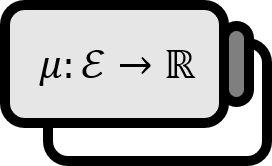Finite Sigma Measures
Definitions 1
Let a measurable space $( X , \mathcal{E} )$ be given.
- If $\mu (X) < \infty$, then $\mu$ is called a finite measure.
- When $$\displaystyle X = \bigcup_{i=1}^{\infty} E_{i} \qquad , E_{i} \in \mathcal{E}$$ for all $i \in \mathbb{N}$ such that $\mu ( E_{i} ) < \infty$, it is called a sigma-finite measure. Also, the ordered pair $(X, \mathcal{E}, \mu)$ is called a sigma-finite measure space.
- If for all $\mu ( E ) = \infty$ there exists a subset $F \in \mathcal{E}$ of $E$ satisfying $0 < \mu (F) < \infty$, then $\mu$ is called a semifinite measure.
- When $\nu$ is a signed measure on the given measurable space and the total variation $| \nu |$ is a finite (sigma-finite) measure, then $\nu$ is called a finite (sigma-finite) measure.
Explanation
- A typical example of a finite measure is probability.
- Sigma-finite measures are a relaxation of the condition for finite measures on the entire set $X$. The $E_{i}$ that make up the whole set must be finite, but their sum $\displaystyle \sum_{i \in \mathbb{N}} \mu ( E_{i} )$ doesn’t need to be finite. In other words, whether $\mu (X)=\infty$ or $\mu (X) <\infty$ doesn’t matter. According to the definition, sigma-finite measures that are $\mu (X)<\infty$ become finite measures.
- The key point in the definition of a semifinite measure is that $F$ satisfies $0 < \mu (F)$. Without this condition, the sigma algebra would include the empty set, so all measures could satisfy this condition. Not all sigma-finite measures are semifinite, but the reverse is not true.
- The following conditions can easily be seen to be equivalent.
- $(a)$ $\nu$ is sigma-finite.
- $(b)$ $\nu^+$, $\nu^-$ are sigma-finite.
- $(c)$ $| \nu |=\nu^+ + \nu^-$ is sigma-finite.
Bartle. (1995). The Elements of Integration and Lebesgue Measure: p19~20. ↩︎
